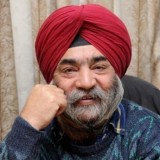
Punjab has been one of those states that has not only won against two-decade long terror-driver turbulence but also for its reiteration and trust in strong democratic norms. After partition of the country in 1947, Congress domination in State politics continued till 1966. Since then, Punjab has been witnessing a fierce tussle for power between a national party — Congress — and a regional party — Shiromani Akali Dal (SAD).
This time, the State may have a new political party or alliance at the helm of affairs. Both Shiromani Akali Dal and Congress have witnessed groups of senior leaders walking out to form their own outfits. Punjab Lok Congress is the offshoot of Congress while Samyukta Akali Dal is the breakaway group of Shiromani Akali Dal.
In the last elections in 2017, the new entrant, Aam Aadmi Party (AAP), after its roaring success in Delhi, managed to push the SAD-BJP alliance to third position by winning 20 seats.
Among new entrants are the Shiromani Akali Dal-Bahujan Samaj Party alliance, Bhartiya Janata Party-Punjab Lok Congress-Samyukta Akali Dal alliance and Samyukat Samaj Morcha (Balbir Singh Rajewal).
Incidentally, SAD had always enjoyed the support of Bharatiya Janata Party, a major national party, as its alliance partner. In 2021, this oldest alliance crumbled after the Union Government passed the three Farm Laws.
The Congress and the SAD, as two major political opponents, have been ruling the state alternately since reorganization of the State on November 1, 1966. Their rules have been punctuated with spells of varying periods of the President’s rule. These Presidential intervention on recommendation of the Governor were either because of political uncertainty or because of terrorism that engulfed the state for over two decades since late 1979.
It was because of terrorism that State also witnessed major boycott of the electoral process, first in 1985 when certain wings of the Akalis stayed away and then in 1992 when the mainstream Akali Dal boycotted the elections. In 1991 when Chandrasekhar was Prime Minister and elections were called to restore democracy in the State, Congress decided to stay away. Intriguingly, a day before polling was to be held in the State, elections were called off as the Centre Congress had come back to power and the minority government of Chandrasekhar bowed out.
Akalis had protested the last-minute cancellation maintaining that more than 30 candidates had fallen to the bullets of terrorists while reposing their faith in democracy. Subsequently when elections were called again in February 1992, Akalis led by Parkash Singh Badal, boycotted. Only a fraction of Akalis led by Amarinder Singh contested on 58 of 117 seats and won on three. BJP, the traditional alliance partner of Akalis, however, participated in the 1992 elections though without much success. Even its Hindu card at that time did not work.
While the Congress has enjoyed seven full-term governments — those of 1952, 1957, 1962, 1972, 1992, 2002 and 2017 the Shiromani Akali Dal that made history in 1997 by becoming the first non-Congress party to complete its first full term in office since Independence, has repeated its 1997 feat in 2007 and 2012.The only time Punjab electors did not give any party or alliance a clear mandate was the 1967 election, the first after the reorganization of the State. Congress got only 48 in a house of 104.
It was during this time that the Akalis had their first tryst with power by getting the entire Opposition united to form the United Front government. It was the first multi-party coalition government in the State. In 1985, after signing of the Rajiv-Longowal accord, Akalis graduated to absolute power, winning 73 of the 100 Vidhan Sabha seats they contested. In the 1997 elections, they took this supremacy for power a step further by improving their individual tally to 75 out of 92 seats contested by them.
